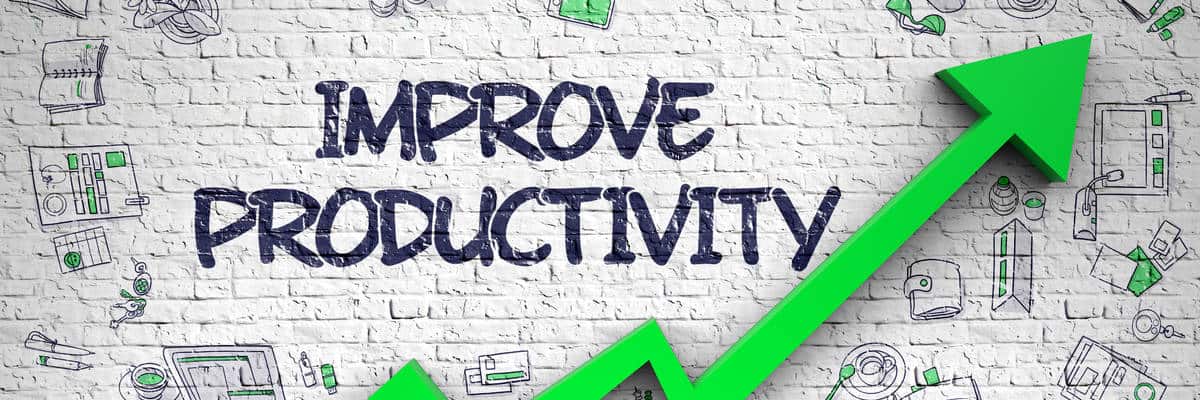
Just because certain sales productivity practices are commonly accepted does not mean they work best.
The sales floor is a high-pressure, results-driven environment– which is why so much emphasis is placed on sales productivity. From sales executives down to entry-level sales reps, sales professionals constantly seek ways to be more efficient, to make more sales, and to hit their goals faster.
Yet, despite all this effort, productivity is often a problem for many sales departments. In fact, 65% of B2B businesses say they struggle with sales productivity (source). Here’s why– the B2B sales culture promotes many outdated, ineffective, or just plain incorrect strategies. So, if you’ve built your sales process based on these productivity myths, you will continue to struggle to hit your targets.
Today, we’re taking a close look at some of the most common sales productivity myths. Let’s get into it!
-
Myth: The most productive sales reps make the most calls.
In recent years, it’s become more well-known that productivity can’t be quantified by the number of calls a rep makes– yet many sales organizations continue to do so. This puts an extreme amount of pressure on reps to make a lot of calls so they can prove to their managers that they use their time wisely.
There’s nothing inherently wrong with having a high call volume– but it should not take priority over call quality.
Here’s what we mean– let’s say a sales rep makes 15 calls in an hour. But, due to inaccurate contact data, they fail to reach the decision-makers they want to talk to. On the other hand, another sales rep makes only 8 calls in that same hour, but is able to reach several important stakeholders. Which rep was more productive?
The best way to improve the quality of your calls is to invest in a B2B contact database to provide you with accurate and current contact data. Equipped with high-quality contact data, you will be able to target and reach the right decision-makers faster—thus making calls more productive.
-
Myth: It’s a waste of time to follow up with uninterested leads and prospects.
Let’s state the obvious, you rarely reach a potential customer on your first attempt. But, after one call, what do you do? If you’re like many sales reps, you give up and move on to different leads. In fact, sales reps make an average of 1.3 calls to a lead before moving on to new leads (source).
And we get it– why spend time on something that doesn’t seem like it’s going to pan out? But, time spent following up with leads isn’t actually wasted time. Research shows 80% of closed deals required at least 5 follow-ups (source).
Persistence is one of the most important qualities a sales rep can have. So, don’t miss out on future buyers because you give up too quickly.
-
Myth: Administrative tasks are an unavoidable part of the job.
You may have the term “sales” in your job title, but you probably spend a frustratingly small amount of time selling. In fact, the average sales rep spends just a third of their time talking to prospects (source). Much of a sales rep’s day consists of administrative tasks like data entry, scheduling meetings, and responding to emails.
That statistic may not surprise you– as most sales professionals simply accept these time-consuming tasks as a necessary part of their job. In the past, that may have been true. But given the technology available to modern sales reps, there’s no reason to waste the majority of your day on tasks that can be automated.
Sales enablement tools can take the administrative busywork off your hands and allow you to spend more time interacting with your prospects. Familiarize yourself with these tools and don’t be afraid to propose new solutions to your manager. After all, your leadership team is also looking for ways to improve sales productivity.
-
Myth: You will only be productive if you constantly multi-task.
Prospecting, selling, reading emails, attending meetings– these are just a few of the many tasks a sales rep is responsible for each day. This massive workload has led many sales reps to believe multitasking is essential to sales productivity.
When sales reps juggle several tasks at once, however, their productivity actually decreases. Cognitive studies show that multitasking damages your focus and will have a long-term negative effect on the quality of your work (source).
You may believe that multitasking is the only way you can get through your day. But, if you stick to a pre-determined schedule, you will be able to devote adequate attention to one task at a time—ultimately increasing your productivity. For this reason, we recommend you block off specific parts of your day to focus strictly on a single task without any distractions.
Of course, we understand this technique won’t always be possible. But, finding small ways to increase your productivity bit by bit, will have a big impact on the quality of your work and the success you achieve.
-
Myth: Taking breaks will make you less productive.
Much like multitasking, working nonstop is often glamorized and considered an indicator of a productive salesperson. After all, you’re constantly working to meet a quota, so stepping away from your desk can seem like a setback.
But, believe it or not, taking breaks can actually help you become more productive on a day-to-day basis. In fact, several studies have proven that small breaks from your work can significantly improve your mental performance.
Working nonstop isn’t sustainable in the long-term– eventually, stress and fatigue will build up and your productivity will take a steep decline. Avoid this type of burnout by scheduling several small breaks throughout your day. Step away from your desk and when you return you’ll be refreshed and ready to complete your next task.
Final Thoughts
There’s no magic fix for increased sales productivity. Methods that work for one sales organization may not work for another, and vice versa. We encourage you to determine what kind of structure works best for you and then optimize your time and sales strategy to hit your goals faster.
Remember, just because certain practices are commonly accepted does not mean they work best. Replace these popular misconceptions with more modern, efficient strategies and you will see your sales productivity rise.
About the author
Sam Holzman
Sam Holzman is the Content Marketing Specialist at ZoomInfo where he writes for their…
Get FREE Sales Training Delivered to Your Inbox
Join more than 360,000 professionals who get our weekly newsletter.
Related Articles

Learn Online
Self-paced courses from the
world's top sales experts

Virtual Training
Live, interactive instruction in small
groups with master trainers

Coaching
One-to-one personalized coaching
focused on your unique situation






